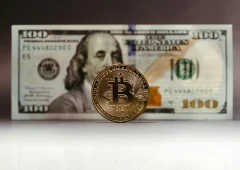Digital Gold Rush: Tokenized Market Breaks $1.2 Billion
02.04.2025 21:00 2 min. read Alexander Stefanov
Tokenized gold is gaining momentum, with its market cap now surpassing $1.2 billion, driven by record-high gold prices and increasing interest in blockchain-based assets.
Investors are drawn to digital gold options like Tether Gold (XAUT) and Paxos Gold (PAXG) as traditional gold storage methods seem outdated compared to modern digital alternatives.
Don Tapscott of the Blockchain Research Institute believes that tokenizing gold can revolutionize the $13 trillion market by enhancing transparency and liquidity. He argues that digitizing gold reserves could make them more accessible and trackable, contrasting the static vault-based approach still common today.
Leading the market, Paxos holds about 52% of tokenized gold, while Tether follows closely with nearly 47%. Meanwhile, Matador Technologies is exploring innovative methods by offering tokenized gold on the Bitcoin blockchain, combining physical gold claims with limited-edition digital art.
There’s also talk of the US modernizing its gold holdings. After President Trump’s recent move to establish a Strategic Bitcoin Reserve, Treasury Secretary Scott Bessent hinted at the possibility of monetizing national assets, sparking speculation about tokenizing Fort Knox’s reserves. Some analysts see this as a potential shift in how gold could be managed at a national level.
On the global stage, China and Russia might take a different approach by launching a gold-backed stablecoin, potentially challenging the dominance of USD-backed digital assets. According to Max Keiser, this could appeal to countries seeking a more stable alternative, as gold-backed assets are seen as inflation-resistant compared to volatile cryptocurrencies.
As the financial landscape continues to evolve, the merging of gold with blockchain technology is redefining traditional asset management, signaling a shift toward more transparent and flexible investment solutions.
-
1
German State-Owned Development Bank Issues €100 Million Blockchain Bond
11.07.2025 7:00 2 min. read -
2
Tether Ends Support for Five Blockchains in Infrastructure Shift
12.07.2025 11:30 2 min. read -
3
Cardano and Ethereum Lead in Developer Activity as GitHub Commits Surge
14.07.2025 12:00 1 min. read -
4
BNB Chain Upgrades and Token Delistings Reshape Binance Ecosystem
16.07.2025 22:00 2 min. read -
5
Ripple Powers UAE’s First Tokenized Real Estate Project via XRPL
16.07.2025 21:00 2 min. read
U.S. Public Pension Giant Boosts Palantir and Strategy Holdings in Q2
According to a report by Barron’s, the Ohio Public Employees Retirement System (OPERS) made notable adjustments to its portfolio in Q2 2025, significantly increasing exposure to Palantir and Strategy while cutting back on Lyft.
Key Crypto Events to Watch in the Next Months
As crypto markets gain momentum heading into the second half of 2025, a series of pivotal regulatory and macroeconomic events are poised to shape sentiment, liquidity, and price action across the space.
Here is Why Stablecoins Are Booming, According to Tether CEO
In a recent interview with Bankless, Tether CEO Paolo Ardoino shed light on the growing adoption of stablecoins like USDT, linking their rise to global economic instability and shifting generational dynamics.
U.S. Dollar Comes Onchain as GENIUS Act Ushers in Digital Era
In a statement that marks a major policy shift, U.S. Treasury Secretary Scott Bessent confirmed that blockchain technologies will play a central role in the future of American payments, with the U.S. dollar officially moving “onchain.”
-
1
German State-Owned Development Bank Issues €100 Million Blockchain Bond
11.07.2025 7:00 2 min. read -
2
Tether Ends Support for Five Blockchains in Infrastructure Shift
12.07.2025 11:30 2 min. read -
3
Cardano and Ethereum Lead in Developer Activity as GitHub Commits Surge
14.07.2025 12:00 1 min. read -
4
BNB Chain Upgrades and Token Delistings Reshape Binance Ecosystem
16.07.2025 22:00 2 min. read -
5
Ripple Powers UAE’s First Tokenized Real Estate Project via XRPL
16.07.2025 21:00 2 min. read


